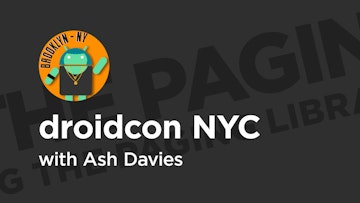
The Android Paging Library makes it easy to integrate complex paging behaviour, gradually loading small chunks of data at a time to help reduce usage of network bandwidth and system resources. The library allows you to implement this behaviour using compositional components in a decoupled architecture making your code more reliable, scalable, and testable. Furthermore, you’ll be able to use familiar components such as LiveData or RxJava to interface with your existing architecture. In this talk, you will learn how to integrate the PagedList component into your architecture, how to implement a DataSource to load snapshots when...
Read more
Good to know
Save this course
Activities
Career center
Mobile Developer
Android Developer
Data Engineer
Software Architect
IT Architect
Cloud Architect
Web Developer
System Administrator
Software Engineer
Database Administrator
UX Designer
Software Tester
Product Manager
Data Analyst
Data Scientist
Reading list
Share
Similar courses
OpenCourser helps millions of learners each year. People visit us to learn workspace skills, ace their exams, and nurture their curiosity.
Our extensive catalog contains over 50,000 courses and twice as many books. Browse by search, by topic, or even by career interests. We'll match you to the right resources quickly.
Find this site helpful? Tell a friend about us.
We're supported by our community of learners. When you purchase or subscribe to courses and programs or purchase books, we may earn a commission from our partners.
Your purchases help us maintain our catalog and keep our servers humming without ads.
Thank you for supporting OpenCourser.


